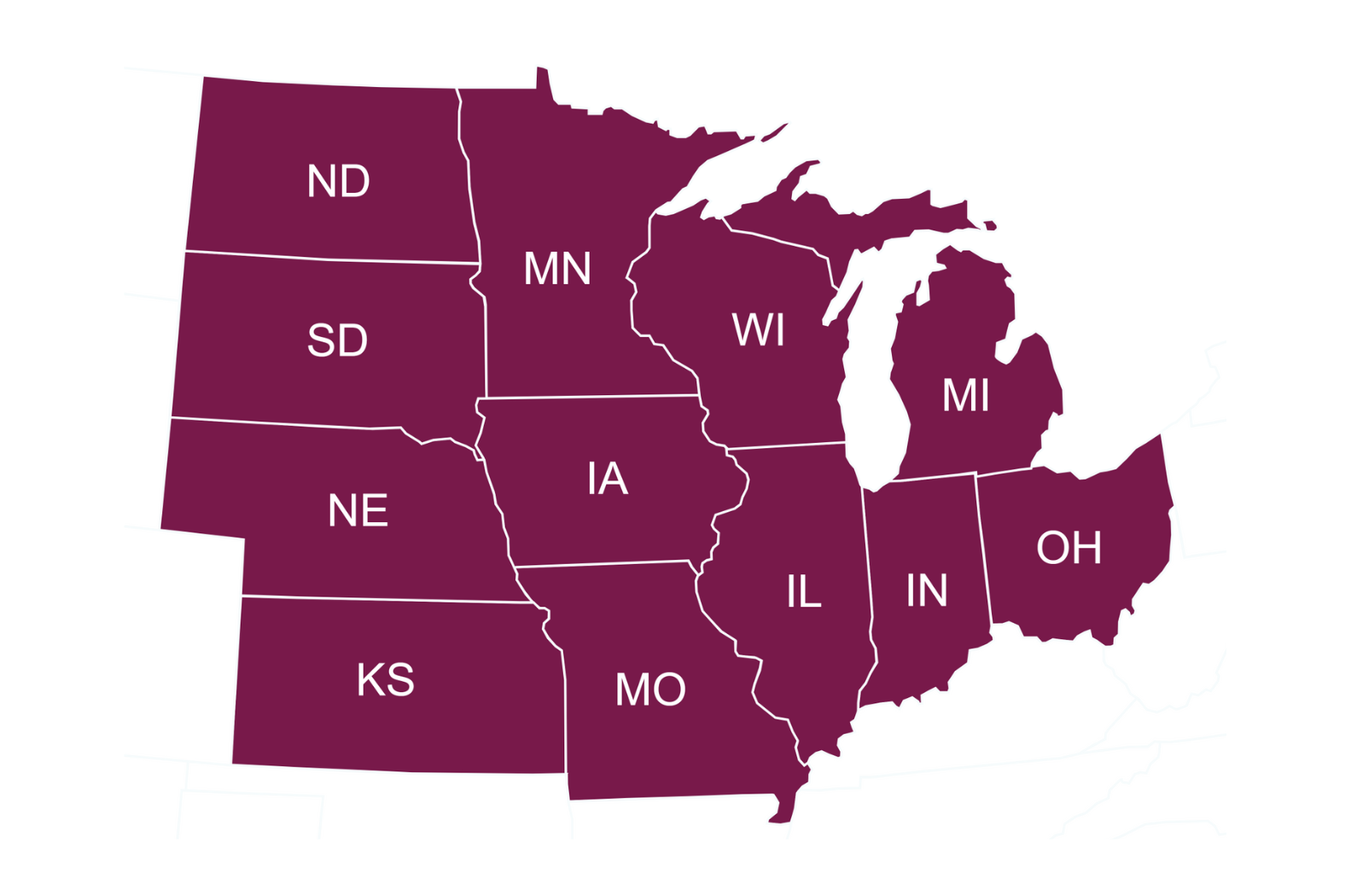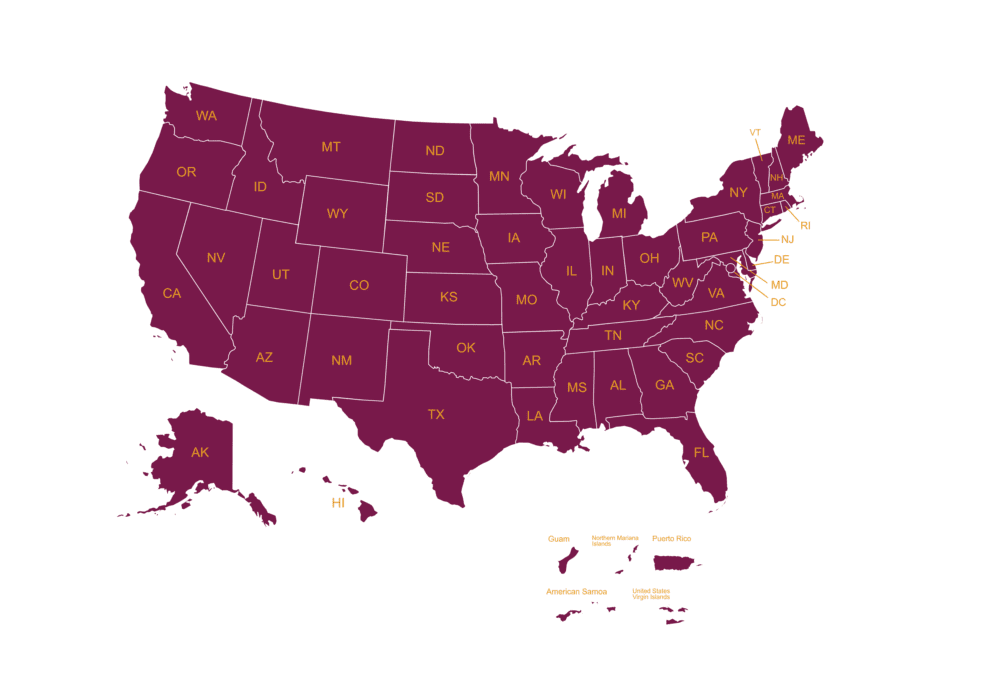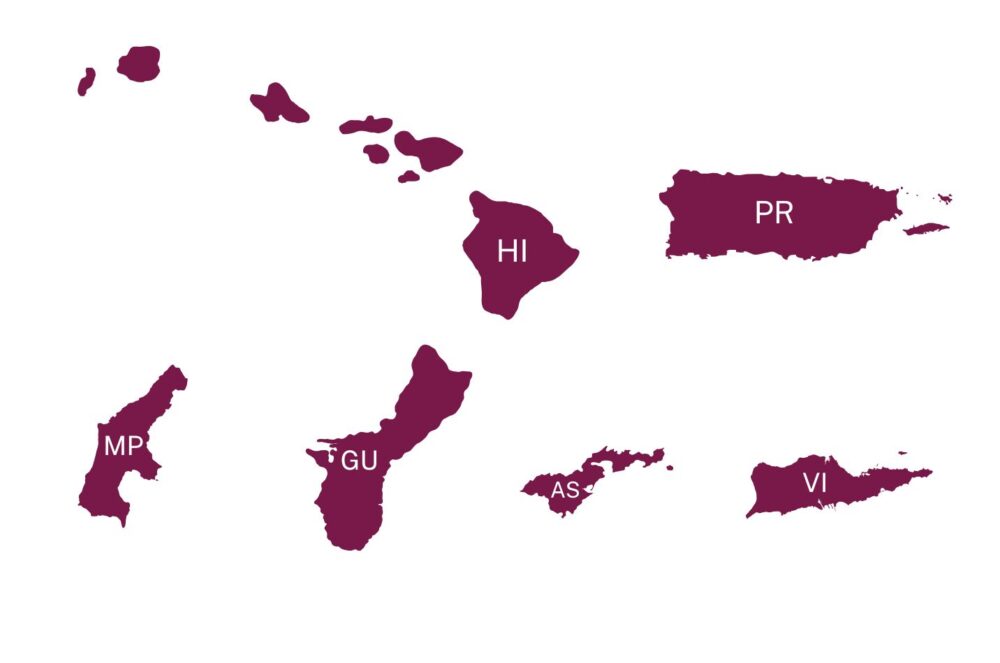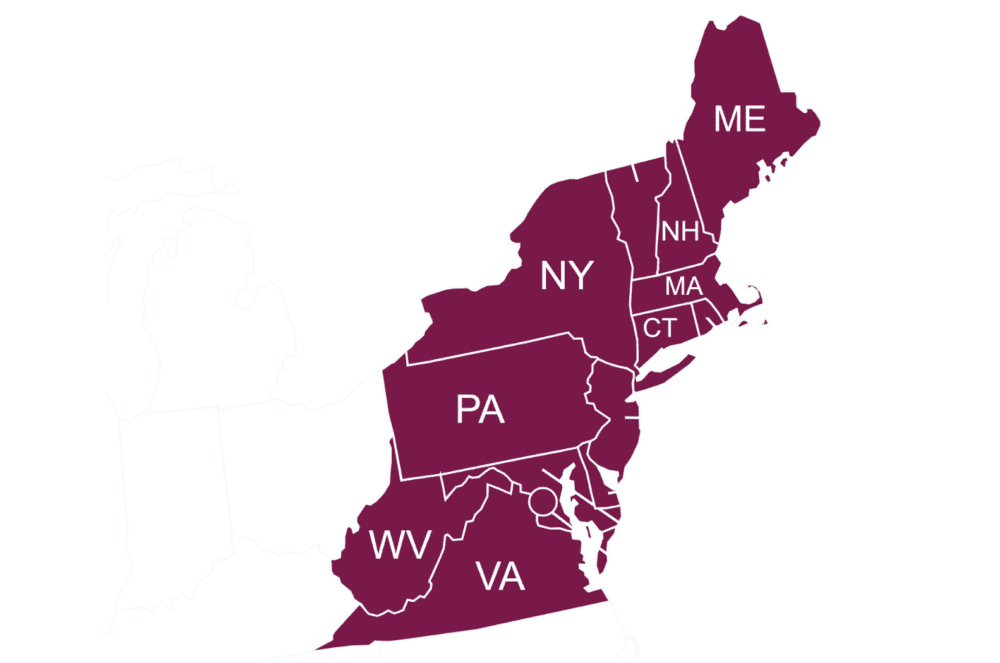Jump to Your State: Indiana | Illinois | Iowa | Michigan | Nebraska | North Dakota | Ohio | South Dakota | Wisconsin
On Monday, March 31, the Federation of State Humanities Councils learned that DOGE (Department of Government Efficiency) is targeting the National Endowment for the Humanities (NEH) with the aim of substantially reducing its staff, cutting the agency’s grant programs, and rescinding grants that have already been awarded. The National Endowment for the Humanities is the only federal agency that funds our nation’s 56 state and jurisdictional humanities councils.
Starting late in the evening on Wednesday, April 2, all humanities councils received emails and letters under the signature of NEH Acting Chair Michael McDonald notifying them that all awarded grants—including their 5-year General Operating Grants and other program-specific awards—were canceled in their entirety, effective April 1.
We asked humanities councils around the country to share what their state will lose if these cuts go through. Here’s how Midwestern states will be negatively impacted by the loss of National Endowment for the Humanities funds and defunding of their state humanities council. While not every state contributed to this article, every state in the Midwest will be affected.
What will be lost in Indiana if NEH funding for humanities councils is cut?
Founded in 1972, the nonprofit Indiana Humanities is the official humanities council of Indiana. It is funded through the National Endowment for the Humanities. President and CEO Keira Amstutz shared what Indiana will lose if Indiana Humanities’ federal funding is cut.
“Indiana Humanities utilizes NEH funds to support programs across the Hoosier State. If those funds were to disappear, it would mean that residents in cities, towns, and rural areas would lose access to traveling exhibitions, speakers series, film screenings, community-conversation programs, and more.
Our ability to provide grants to help groups celebrate local history, hold teacher workshops, host cultural festivals, provide educational activities for students, or engage residents in their towns’ unique architectural heritage would be severely limited. This loss would be felt especially hard in small towns and rural areas without other funders to invest in cultural programs that enrich lives and create a sense of belonging.
Furthermore, without NEH funding, Indiana Humanities would no longer be able to serve as a statewide convener and connector. Given our rather modest budget, we have an outsized footprint in the state. We reach out to partners throughout Indiana, building meaningful and collaborative relationships with them—helping them to grow their skills, providing them with guidance on programming and fundraising, promoting their work to others, and connecting them to valuable resources. A loss of NEH funding would stop us from providing these services to Hoosiers, which would diminish quality of life and make Indiana a less-competitive place to live and work.
Federal funding allows Indiana Humanities to effectively and efficiently serve our state’s rural, urban and suburban communities. The investment of federal funds has a massive impact on Hoosiers and is leveraged by Indiana Humanities and our community partners. In the previous two years, for every dollar that Indiana Humanities invested, $2.37 was further invested by the community.”
What will be lost in Illinois if NEH funding for humanities councils is cut?
Founded in 1974, the nonprofit Illinois Humanities is the official humanities council of Illinois. It is funded through the National Endowment for the Humanities. In a press release, Executive Director Gabrielle Lyon shared what Illinois will lose if Illinois Humanities’ federal funding is cut.
“The impact on Illinois—and the country—will be staggering. Our grant that was terminated represents a third of our budget—roughly $2 [million]. This loss means we will be unable to provide free history and heritage programs, funding for rural museums and historical societies, and otherwise unavailable educational programs for youth and adults. Now multiply that across every state and territory.
The NEH has directed $34M in funding to Illinois since 2019. Grants support essential cultural infrastructure spanning museums, universities, community organizations, as well as programs that benefit veterans, rural communities, and more. From the Field Museum in Chicago and the University of Illinois at Urbana-Champaign, to the Western Illinois Museum in Macomb and the Cairo Historical Preservation Project, the impact of these cuts will be detrimental to every county and congressional district in Illinois.
As a nonpartisan, statewide nonprofit organization, we take our responsibility to steward the funding we receive from all sources—individuals, foundations, and government—extremely seriously,” Lyon said. “Last year alone, we served over 20,000 Illinoisians and awarded 137 grants totaling more than $800,000 to small towns and rural communities—communities not eligible for other sources of funding. I cannot overstate the importance of this agency to Illinois.”
Hear more about the human cost of these cuts in an impact piece written by Lucy Biederman, an instructor for Illinois Humanities’ Odyssey program, which offers free college courses that empower adult learners to jump-start their education in a supportive community of students and educators.
Read more coverage of these cuts’ impact in Illinois: EIN News
What will be lost in Iowa if NEH funding for humanities councils is cut?
Founded in 1974, the nonprofit Humanities Iowa is the official humanities council of Iowa. It is funded through the National Endowment for the Humanities. President & CEO Jennifer Rupp shared what Michigan will lose if Michigan Humanities’ federal funding is cut.
“These unprecedented cuts would gut Iowa’s cultural infrastructure and dismantle programs that serve as a lifeline for rural and underserved communities.
Learn more about how this impacts Humanities Iowa here.
Earlier this year, Humanities Iowa was named Iowa’s official state partner of the NEH, which would have unlocked critical multi-year federal funding. That partnership is now in jeopardy.
As a result of this:
- Humanities Iowa will be forced to cut grants, programs, and staff effective April 30, 2025.
- Humanities Iowa grants, which provided vital seed funding to rural libraries, museums, and cultural nonprofits will end.
- Original programming including literacy and intergenerational learning programs supported by Humanities Iowa will not continue.
The very stories, heritage, and dialogue that bind our state together are at risk.
This is not theoretical. This is immediate.”
Read the full statement on NEH cuts from Humanities Iowa here.
What will be lost in Michigan if NEH funding for humanities councils is cut?
Founded in 1974, the nonprofit Michigan Humanities is the official humanities council of Michigan. It is funded through the National Endowment for the Humanities. President & CEO Jennifer Rupp shared what Michigan will lose if Michigan Humanities’ federal funding is cut.
“Michigan Humanities uses NEH funds to support hundreds of organizations across the state through free statewide programming and accessible funding opportunities. In 2024, Michigan received over $4M for projects through direct NEH funding. If NEH funding were to disappear, we would not be able to maintain any of our grant programs, our 20-year-old statewide Great Michigan Read program, or sustain our organization. Since 2020, Michigan Humanities has awarded over 1,100 grants to organizations for public humanities work in all 83 counties—impacting over 11 million people.
Michigan Humanities does not receive any state funding. NEH funding makes up 90% of our budget. Federal funding is critical to not only our existence, but hundreds of libraries, small museums, and rural nonprofits who would not be able to offer the programming their communities depend on.”
What will be lost in Nebraska if NEH funding for humanities councils is cut?
Founded in 1973, the nonprofit Humanities Nebraska is the official humanities council of Nebraska. It is funded through the National Endowment for the Humanities. Executive Director Chris Sommerich shared what Nebraska will lose if Humanities Nebraska’s federal funding is cut.
“Humanities Nebraska partners with hundreds of organizations all across our state every year. If NEH funding goes away, rural areas will suffer the most, as it is more difficult to raise private funds for activities in small communities. We will need to significantly cut back on many different programs that reach people of all ages and walks of life.
Because we are able to use federal funding to cover our operational and administrative costs, we can then tell donors that 100% of their contributions go to our programming. Losing federal funding will make private fundraising more difficult and will negatively impact all of the organizations and people we work with throughout the state.
We intend to carry on with the programs planned and underway as best we can, but will have difficult decisions about elimination and cuts in programs and grants in order to operate within our means in a new reality without NEH.
This new reality would mean fewer grants and less funding distributed to local groups all over the state; fewer speakers coming to libraries, schools, senior centers, and other community groups; reduction or elimination of writing workshops for veterans; reduction of programs reaching small rural communities, where it is more challenging to raise private support, reduction in Prime Time Family Reading programs at a time where demand from schools and libraries is increasing
There is a remarkable, efficient cultural infrastructure that is created by the partnership between NEH at the federal level, the state humanities councils, and all of our local partners (hundreds in every state). This infrastructure has great value beyond money, and will not be easily rebuilt once it’s dismantled.”
Read Nebraska Humanities statement and FAQ on NEH cuts.
What will be lost in North Dakota if NEH funding for humanities councils is cut?
Founded in 1973, the nonprofit Humanities North Dakota is the official humanities council of North Dakota. It is funded through the National Endowment for the Humanities. Executive Director Brenna Gerhardt shared what North Dakota will lose if Humanities North Dakota’s federal funding is cut.
“How can America celebrate its 250th anniversary without history, without the words of our greatest poets and authors, without the philosophical foundations that shaped our democracy? NEH funding makes that celebration possible. It sustains civics education for Americans of all ages—from high school students to retirees—and, most importantly, it creates the conditions for civil dialogue in a time when our democracy needs it most. It keeps lifelong learning accessible, affordable, and rooted in the wisdom of our nation’s greatest thinkers.
Federal funding is critical to Humanities North Dakota because it ensures that all North Dakotans—regardless of income, background, or location—can access high-quality humanities programs. It allows us to offer free or low-cost classes, events, and resources that foster lifelong learning, civic engagement, and meaningful dialogue. Federal support through agencies like the National Endowment for the Humanities provides the stable foundation needed to serve rural communities, support educators, preserve cultural heritage, and sustain the intellectual and civic life of the state. Without it, these opportunities would diminish, especially in underserved areas where private funding is limited.”
Read North Dakota’s call to action for supporters.
What will be lost in Ohio if NEH funding for humanities councils is cut?
Founded in 1972, the nonprofit Ohio Humanities is the official humanities council of Ohio. It is funded through the National Endowment for the Humanities. In a statement on their website, President and CEO Rebecca Brown Asmo shared what Ohio will lose if Ohio Humanities’ federal funding is cut.
“Ohio Humanities’ mission is at stake. This decimates our ability to serve Ohio, freezing our grant program and interfering with our ability to tell stories that are essential to our cultural infrastructure. This is an existential crisis for cultural organizations—and all of Ohio’s stories.
The humanities are our history, our heritage, and the chronicling of what we do today so that future generations can learn from our experiences. The projects we fund—from the restoration of a WWII bomber for public display to a documentary film about Ohio’s unique role in the Civil Rights Movement—bring stories, context, and economic development to Main Streets across the state.
Ohio Humanities and the federal funding we receive is critical for many reasons:
We serve everyday Ohioans statewide, from school children to veterans, living everywhere from one-stoplight communities to big cities. No private funder will look at a whole state and demand programs that benefit communities statewide. We are an important partner in Ohio’s America 250 Commission, providing infrastructure and support that ensures Ohioans can enjoy our country’s upcoming 250th anniversary celebration on Main Streets across the state. We can multiply funding, leveraging federal dollars into additional private and state money, effectively tripling every federal dollar.
Without Ohio Humanities, projects like these may not exist:
An open mic night at the National Veterans Memorial and Museum that allowed veterans—some for the first time—to express their feelings through poetry and music. Historical projects and events meaningful to Ohio communities, from the restoration and display of a WWII bomber to a Living History Field Day for 8th grade students in Athens to ‘Beyond the Battlefield,’ a two-day interactive event that offered people in Fort Recovery a memorable look at the past. The Lincoln School Marchers documentary, which has aired to tens of thousands of viewers nationwide, and book, which shares the remarkable story of Ohio’s important role in the Civil Rights Movement.”
Read the full statement on cuts from Ohio Humanities.
Read coverage of the cuts’ impact in Ohio: WOSU, Lancaster Eagle-Gazette, Ideastream
What will be lost in South Dakota if NEH funding for humanities councils is cut?
Founded in 1972, the South Dakota Humanities Council (SDHC) is a nonprofit and the official humanities council of South Dakota. It is funded through the National Endowment for the Humanities. In a statement on their website, they shared what South Dakota will lose if the South Dakota Humanities Council’s federal funding is cut.
“For decades, NEH funding has been the backbone of the South Dakota Humanities Council’s mission, allowing us to bring humanities-based programs, discussions, and events, including the South Dakota Festival of Books, to citizens across the state. Over the past 53 years, SDHC has funded thousands of programs in every county in South Dakota. We take pride in bringing excellent programs to all of South Dakota, especially people in rural areas.
Among the most devastating losses is the potential end of the Young Readers program, which provides free books to every third grader in South Dakota. SDHC is the only organization in South Dakota that provides a free book to EVERY third grader in the state, no matter where they live or attend school. Since 2014, SDHC has provided 86,715 engaging, age-appropriate books, compliments of the supporters of South Dakota Humanities”
Read South Dakota Humanities Council’s full statement on the cuts here.
What will be lost in Wisconsin if NEH funding for humanities councils is cut?
Founded in 1972, the nonprofit Wisconsin Humanities is the official humanities council of Wisconsin. It is funded through the National Endowment for the Humanities. Executive Director Dena Wortzel shared what Wisconsin will lose if Wisconsin Humanities’ federal funding is cut.
“Loss of NEH funding would end Wisconsin Humanities’ statewide service that reaches every corner of Wisconsin with matching grants, the Love Wisconsin digital storytelling project that shares Wisconsin stories with over 100,000 people, and our Community Powered initiative that trains citizens at the grassroots to use the special tools of the humanities to design and implement local projects that are sustainable and replicable.
Without NEH funding, local traditions would not be revitalized across generations, hometown tours celebrating architecture and history would not be created, and youth-led projects that create community pride would not happen. Matching grants would not be awarded to dozens upon dozens of organizations whose free programs for all Wisconsinites enrich their knowledge, spur community engagement, enhance cultural preservation, build crucial community connections, and increase public health.
Wisconsin Humanities is the only nonprofit in the state dedicated to funding the public humanities. Federal funding is critical to ensuring that Wisconsinites in every corner of the state, of all ages and backgrounds, have the opportunity to learn and connect with one another in ways that celebrate the state’s rich and vibrant history and culture, foster civic engagement, and build stronger, more resilient communities.”




